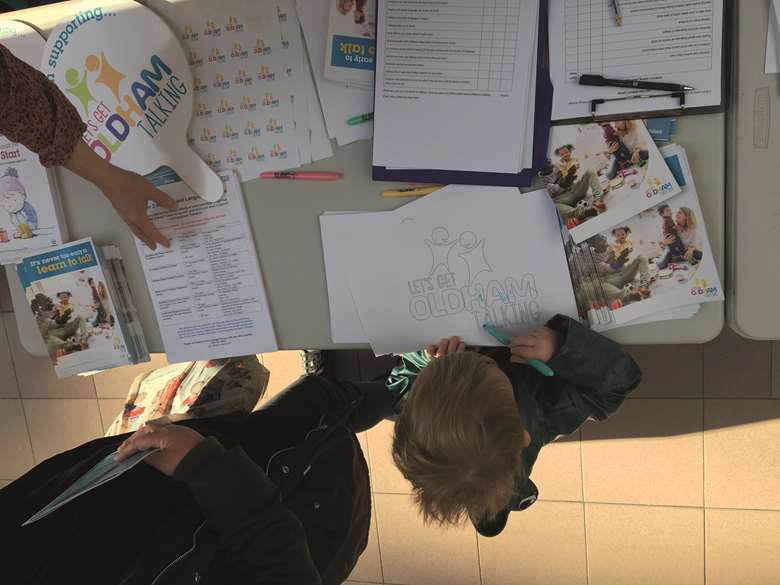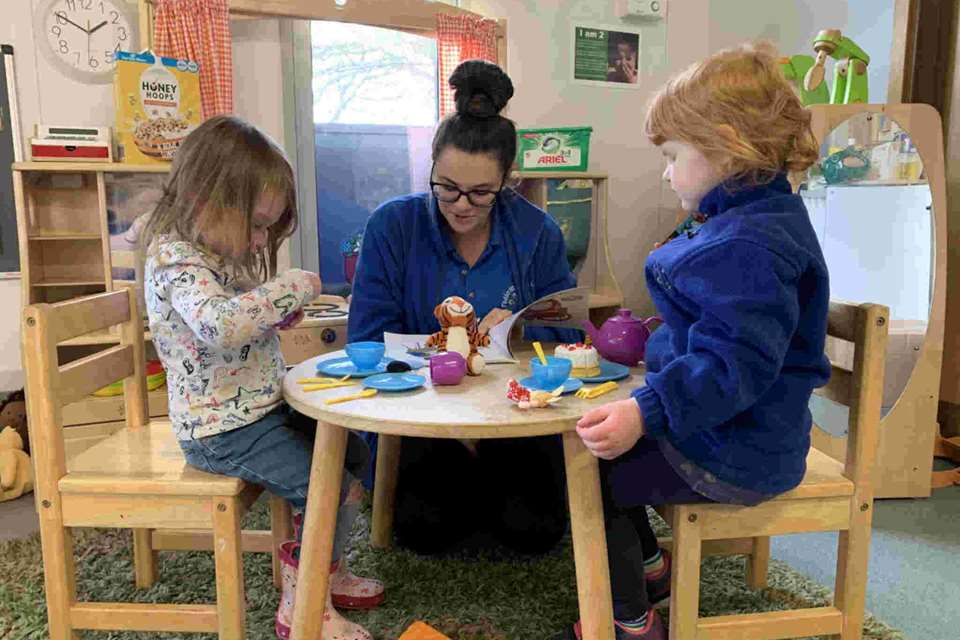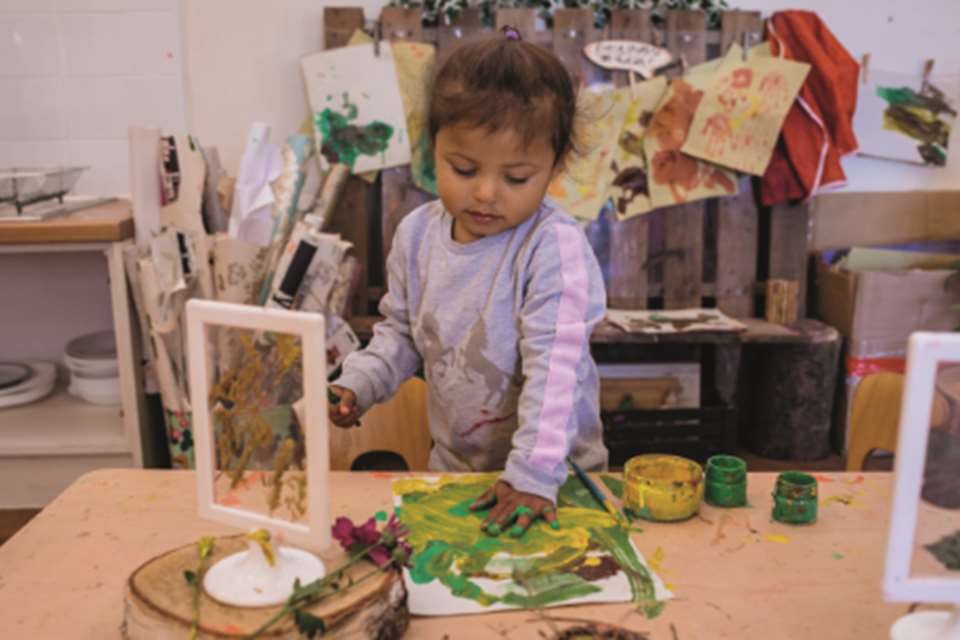Early Intervention: Opportunity Areas: Oldham - At home
By Charlotte Goddard
Tuesday, May 5, 2020
In Oldham, a literacy programme that has helped families improve their home learning environment should stand them in good stead over lockdown. By Charlotte Goddard

With the majority of children currently confined to their house or flat for almost all of their waking hours, the quality of the home learning environment has never been more important. The home learning environment is consistently identified in research as the most significant predictor of a child’s outcomes, and the poorest children are already 11 months behind their better-off peers before they even start at school. Now with the Covid-19 lockdown, that development gap is likely to widen.
‘In the short term, having providers temporarily closed is likely to have the biggest impact on the poorest children, who benefit most from structured provision and are less likely to have the suitable home learning environment needed,’ says Dr Rebecca Montacute, author of The Sutton Trust’s Social Mobility and Covid-19report.
The Government set up Opportunity Areas to focus on tackling social mobility and improving the outcomes of the most disadvantaged. Oldham was ranked 34th out of 326 areas in England on the Multiple Deprivation Index in 2015. Fewer than half (49.6 per cent) of all children on free school meals achieved a good level of development at the end of the EYFS, compared with 54.4 per cent nationally in 2016, and only 62.4 per cent of other children, compared with 71.7 per cent nationally.
When Opportunity Area (OA) funding became available, the locality grabbed the chance to extend the National Children’s Bureau (NCB)’s Making it REAL literacy programme, which was already running in some early years settings. Paula Healey, education improvement manager at Oldham Council, says the quality of the home learning environment has always been part of the council’s early years strategy.
Literacy at home
 REAL stands for Raising Achievement in Early Literacy, and the programme’s framework was first developed by Professors Cathy Nutbrown and Peter Hannon at the University of Sheffield in the 1990s. Using National Lottery funding, the NCB developed Making it REAL, and delivered the programme in the Sheffield area between 2009 and 2012. Oldham has continued to run the programme in various forms since then, using whatever funding is available.
REAL stands for Raising Achievement in Early Literacy, and the programme’s framework was first developed by Professors Cathy Nutbrown and Peter Hannon at the University of Sheffield in the 1990s. Using National Lottery funding, the NCB developed Making it REAL, and delivered the programme in the Sheffield area between 2009 and 2012. Oldham has continued to run the programme in various forms since then, using whatever funding is available.
Ms Healey says, ‘Previously we delivered it in nurseries, but we wanted to test whether we could deliver it in Reception as well.’
The project started in January 2018, running for five terms and involving more than 250 families in 31 schools. Participating schools worked with feeder nurseries where they didn’t have their own nurseries to choose children they felt would most benefit from the programme. Teachers underwent two days of training. Children taking part received eight home visits from teachers or other practitioners, and parents were invited to eight literacy events.
Making it REAL is based on the ORIM framework, standing for Opportunities, Recognition, Interaction, Model. There are four ways in which parents help their children’s literacy development: learning opportunities, such as paper, crayons and books to read; recognition of children’s development, such as noticing when a child makes a small step towards literacy; interaction, such as involving a child in making a mark on a birthday card; and modelling, for example, a parent letting a child see them reading.
‘We find, given a respectful approach, parents do want to get involved in their children’s literacy development,’ says Helen Wheeler, principal officer of the NCB’s Early Childhood Unit. ‘The reason this works where other programmes do not is it involves getting to know families really well.’
Teachers use the home visits to share ideas about activities that promote emerging literacy. ‘They take the ORIM framework and look at how families are playing and interacting with the children, making them feel confident about what they are doing, and identifying any gaps,’ says Ms Wheeler. ‘For example, helping parents become aware that if children are coming to them with scribble and telling them it says something, or if a baby is holding a book upside down and pretending to read it, that is not wrong, that is a massive step in the right direction.’
An evaluation of the programme found children in the Making it REAL cohort were making accelerated progress in communication, language and literacy from their nursery baseline to the end of Reception, compared with a control group of children in other schools. ‘It’s clear from parent and practitioner feedback there has been a huge impact on parents’ behaviour and confidence, and what they are doing with their families,’ says Ms Healey.
These changes should stand the Making it REAL cohort in good stead during the months they are not at school. Speaking at the end of the second week of school closures, Ms Healey said she had not yet looked at continuing the programme virtually, as other priorities had taken precedence. She says, ‘Now things have settled down a bit we can start to think about how we will continue to support families in the home.’
 Uncertain future
Uncertain future
In November, the Department for Education announced further funding to extend the OA scheme until August 2021. However, Nursery World understands there is no guarantee all existing OAs will get a slice of the money. It is also not clear how much money will be available or how it will be distributed. Whatever happens, Oldham is determined to carry on running Making it REAL.
The OA has also funded the establishment of an Early Years Better Communication Team, comprising teachers and speech and language therapists who offer support, advice and guidance to schools and settings. Early years settings have also benefited from an early literacy training programme, which saw professionals from teaching schools supporting PVI providers to embed their learning into practice.
The proportion of children in Oldham gaining a good level of development went up by four percentage points between 2018 and 2019, from 64.1 per cent to 68.1 per cent. ‘We were one of the most improved local authorities,’ says Ms Healey. However, the attainment gap did not narrow, with outcomes improving across the board. ‘We will be looking at that in the future, homing in on those disadvantaged children,’ she says.
Hearing language
Oldham Council has also been working with children’s communication charity I CAN since April 2019 on an OA-funded campaign to promote the importance of communication to a wider audience. ‘We are trying to get across to the community how important communication and language is, and how important it is to talk to babies and toddlers,’ says Louisa Reeves, I CAN speech and language adviser in North West.
‘People are sometimes unaware there is a need to hear language in order to develop language, and that is particularly prevalent in areas of disadvantage. It’s about making communication development everyone’s business, rather than the early years workforce trying to promote early communication on their own.’
The campaign has included face-to-face events in shopping centres and libraries, online resources and activities, posters and social media activity including a Twitter account and the hashtag #LetsGetOldhamTalking. The team has also been invited to deliver training to students taking part in an early years course. ‘It will be great to get the message out while they are training as then they are in a position to influence the families they are working with,’ says Ms Reeves.
Due to Covid-19, training plans have had to be altered, with a focus on webinars. The team has also put more materials online, kept the Twitter account very active, and plans a virtual roundtable in the summer. ‘We don’t want to lose momentum at the moment when it is even more important to boost public awareness of the importance of early language,’ says Ms Reeves. ‘Parents have always been a child’s first educators, and now that is 24 hours a day.’
Targets and Achievements
Targets
- 70 per cent of children in Oldham will be achieving a good level of development by 2021, with the greatest improvements among disadvantaged children.
- By 2020/2021, Making it REAL will be running across eight target wards, with the percentage of children achieving a good level of development by age five increasing more here than elsewhere, and faster improvement for boys.
Achievements
- The proportion of children in Oldham gaining a good level of development rose from 64.1 to 68.1 per cent between 2018 and 2019. The proportion of boys doing so went up from 57.5 per cent to 60.4 per cent.
- Starting in January 2018, Making it REAL has involved more than 250 families; 91 per cent of families have participated well, and 75 per cent participated at the highest levels.











